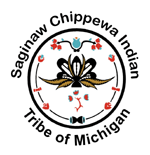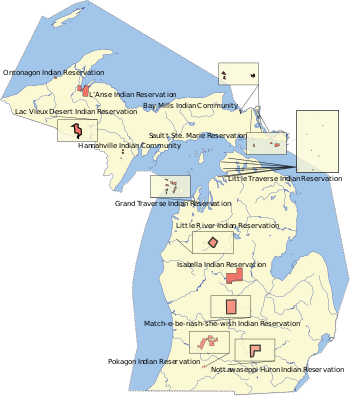Saginaw Chippewa Tribal Nation
 The official Saginaw Chippewa Logo designed by Elder Julius Peters | |
| Total population | |
|---|---|
| 3,296 | |
| Regions with significant populations | |
|
| |
| Languages | |
| English, Ojibwa | |
| Religion | |
| Christianity, traditional tribal religion | |
| Related ethnic groups | |
| Potawatomi |
Saginaw Chippewa Tribal Nation is a federally recognized band of Chippewa (aka Ojibwe) and Odawa Indians located in central Michigan in the United States. These were two of the three tribes who were part of the Council of Three Fires. The third were the Potawatomi people.
The tribal government offices are located on the Isabella Indian Reservation, near the city of Mount Pleasant in Isabella County. They also hold land on the Saganing reservation near Standish. As of February 2007, tribal membership was approximately 3,296.[1] The 2010 US Census reports 2,414 persons living in the Mount Pleasant, Michigan micropolitan area are Native American. The tribe operates the Saginawa Chippewa Tribal College, a 2-year community college open to all in the region.
Economy
The tribe owns and operates Soaring Eagle Casino in Mount Pleasant and Saganing Eagles Landing Casino in Standish. These generate revenue for investment in education and welfare for the tribe, including such facilities as a new elders' center. Besides its gaming enterprises, the tribe owns the Sagamok Shell Station.
Government and operations

In 1966, the nation was among the four founders of the Inter-Tribal Michigan Indian Council, Inc., established to pool their resources for development and to improve relations with state and federal governments. Others were the Bay Mills Indian Community, Keneenaw Potawatomi Indian Community, and Hannahville Indian Community. They have worked together since, and the Council in the 21st century represents 11 of the 12 federally recognized tribes in Michigan.
The tribe operates community facilities including a substance-abuse treatment center, a community clinic, and health facilities. In the early 21st century, the tribe opened a new Elders' Center.
Educational programs include the Saginaw Chippewa Academy (an elementary school). They have Native American advocates and tutors who work with students in the local public schools. Saginaw Chippewa Tribal College is an accredited two-year college which operates with funding from the tribe. The Nation has an agreement with Central Michigan University that allows students to readily transfer credits to CMU to complete a 4-year degree there.
The Saginaw Chippewa Indian Tribe also operates the Ziibiwing Cultural Society (a tribal museum). It encourages use and teaching of the Odawa language and the reservation has the largest community of Odawa language speakers in Michigan.
The tribe hosts a pow-wow every year during the first full weekend of August. This competition powwow takes place at the powwow grounds that are situated on "the Hill" (the only hill on the otherwise flat Isabella Reservation). The Hill is also home to the tribal campgrounds and the Chippewa Indian Methodist Church.
References
- ↑ "", February, 2007, MDOT State Long-Range Transportation Plan (2.1.11)
External links
- Official Tribal Website
- Saginaw Chippewa Tribal College Website
- , Census Fact Finder
- Native Americans in Michigan Databases, Mainly Michigan website, includes "Durant Roll of 1908" and "Mt. Pleasant Indian School Register (1893 to 1932)"